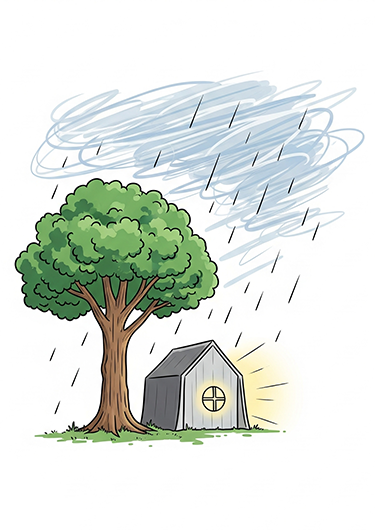
Climate resilience begins with understanding how the climate system works, how climate impacts people, and how human actions influence climate change. Awareness of the impact of extreme wind, temperature, water, food, and energy changes involves understanding the diverse environmental, ethical, economic, cultural, and civic challenges worldwide. Most importantly, it is about being prepared. We mustn’t assume that we can live or travel anywhere under any conditions. We must become knowledgeable about our resources wherever we live. Once settled, we must have backup plans to shelter during dangerous storms. Around the world, everyone is susceptible to extreme weather conditions. Planning for safe shelter, stocking up on water and food, and having emergency energy shelters are essential.
Climate change isn’t just about melting glaciers or shrinking polar bears. It’s about people, their homes, cities, jobs, health, and futures. Whether it’s a record-breaking heatwave, a flash flood that shuts down a university, or a hurricane that knocks out power for days, climate events are touching more lives every year.
But there is good news: we can adapt. We can prepare. We can build back better. This is what climate resilience is all about.
Activity 1 – What is Climate Resilience and Why Does it Matter?

Climate resilience involves preparing individuals and communities to respond to extreme weather. It consists in being prepared for changes in temperature, extreme winds, fallen trees, flooding, power outages, food and clean water shortages. It calls upon those of us who can help communities to study the possibilities of climate disasters, to organize policies to upgrade infrastructure, and to prepare protective strategies for elderly, disabled, and infant individuals to have access to protective temperatures and safe spaces during climate disasters and following extreme weather conditions. Climate resilience encompasses scientific, physical, cultural, and social aspects. Understanding climate resilience involves preparing all of us to make informed decisions to protect people and ecosystems in a changing world, as well as organizing rescue missions when necessary.
How would your life change if your city flooded for three days? What would you need to bounce back?
Activity 2 – Resilient Cities and Infrastructure

Modern cities face complex climate challenges, from heatwaves that buckle roads to rainstorms that overwhelm sewage systems. Climate-resilient infrastructure refers to the design of systems that remain functional even during extreme events. Copenhagen, for instance, has redesigned streets to double as waterways, allowing parks and playgrounds to soak up excess rainwater. Check out Climate This kind of thinking, planning for disasters rather than reacting afterward, helps reduce damage, save lives, and save money. New buildings might be raised above the flood level. Roads might be designed to drain water more efficiently. Even public transit routes may be adapted to ensure emergency services reach vulnerable areas quickly. Resilience planning also links to justice. Cities must ensure that upgrades benefit all neighborhoods, not just wealthy ones.
Can you think of a street, park, building, or area in your city that could serve a new purpose during floods or heat waves?
Activity 3 – The Power of Nature-Based Solutions

What if we told you that trees, wetlands, and green roofs are some of our most powerful tools against climate change? Nature-based solutions (NbS) work with ecosystems, not against them. They reduce urban heat, absorb stormwater, clean air, and improve biodiversity while making cities more beautiful.
For example, a green roof on a school can keep buildings cooler in summer and reduce runoff during storms. Rain gardens can catch and filter water. Urban forests can shade neighborhoods and reduce the heat island effect. These approaches are cost-effective and offer multiple benefits, especially in areas where budgets are tight.
If a school in your area could redesign one space using nature, what would it be, and what climate problem could it help solve?
Activity 4 – Social Equity in Climate Resilience

Climate change doesn’t affect everyone equally. Low-income communities, people of color, Indigenous peoples, the elderly, and those with disabilities often suffer the most, yet they have the fewest resources to recover. For example, during heat waves, people without air conditioning or access to cooling centers face serious health risks.
A truly climate-resilient society must put equity at the center. That means designing policies and systems that consider who is most vulnerable. It includes investing in early warning systems for all languages, funding resilient housing in marginalized neighborhoods, and ensuring fair access to emergency services and healthcare. Building resilience without addressing inequality can unintentionally make gaps worse. But when done right, climate action can also be social justice action.
Why is it important to consider vulnerable populations when designing climate solutions?
Activity 5 – Resilience Hubs and Community Preparedness

Imagine a place where you can go during a blackout or flood, a building that stays cool during a heatwave, has clean water, offers internet access, medical supplies, and even charging stations for your phone. That’s a Resilience Hub. These hubs are designed to support communities before, during, and after a climate emergency. They double as community centers when there is no crisis, offering education, childcare, food distribution, and social services. During disasters, they become lifelines, safe spaces where people can gather, access information, and recover. For students and young professionals, resilience hubs are opportunities to get involved through design, volunteering, organizing, and spreading awareness.
What would your ideal resilience hub include? Who would use it? Propose a Resilience Hub and add it to the Gallery!
Activity 6 – Resilient Energy Systems

Electricity powers nearly every part of modern life, from lighting and heating to communication and transportation. But climate disasters often knock out power when it’s most needed. That’s why resilient energy systems are a must. Solar panels with battery storage can keep critical systems running even during long outages. Microgrids can isolate a school, hospital, or neighborhood from the main power grid to stay online. In areas facing increasing wildfires or hurricanes, such upgrades save lives. Resilient energy also helps cut greenhouse gas emissions, creating a win-win: prepare for disasters and prevent worse ones in the future.
*Do you know if your school or home uses renewable energy? What would be the benefits of adding solar panels? If there is not possibility of Solar Panels, what other energy sources could you sequester? *
Activity 7 – Water Security and Climate Change

Climate change is turning water into both a threat and a scarcity. Droughts, floods, and contamination are becoming more frequent and intense. Managing water wisely is essential to both survival and resilience.Resilient water systems include rainwater harvesting, greywater recycling, better stormwater management, and repairing leaking pipes. For cities, it might mean expanding reservoirs or building nature-based filtration systems. For individuals, it means conservation and awareness.
Access to safe, clean water is not just a climate issue, it’s a human rights issue. Check out Strategies for Resilient Communities and find out what other cities are doing to be be prepared for flooding. Can you list three ways to save or reuse water? Look at your neighborhood and label where water resilient systems are in place.
Activity 8 – The Role of Youth in Building Resilience

You are not just the leaders of tomorrow, you are the change-makers of today. Around the world, young people are organizing climate strikes, designing apps to track local flood risks, creating educational campaigns, and helping their communities prepare for emergencies.
Universities and schools can empower students by offering courses, internships, and research opportunities in climate resilience. Local governments and NGOs are also seeking fresh ideas and energy. Whether you’re passionate about health, tech, policy, design, or education, there is a place for you in this movement.
What’s one action you could take this year to help your community become more resilient?
Review
- What is climate resilience?
- What is one way Copenhagen adapted its streets for climate resilience?
- What do nature-based solutions help reduce in cities?
- Who is most affected by climate change according to the text?
- What is a Resilience Hub?
- How can solar panels with battery storage help during disasters?
- What is one way cities can improve water resilience?
- How are young people helping build climate resilience?


















































